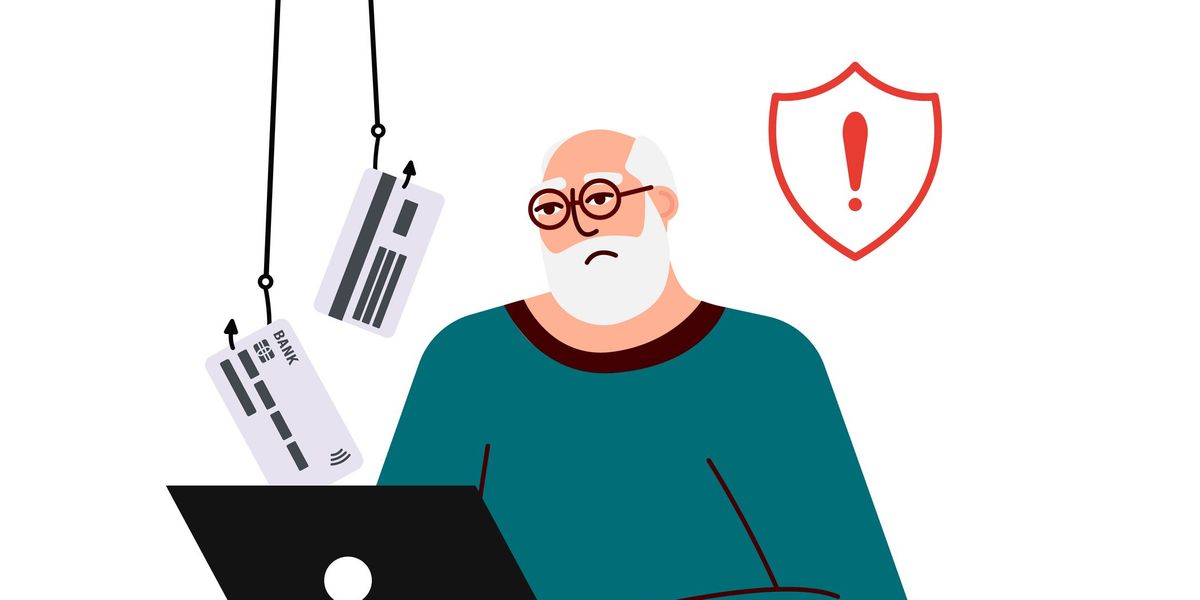A person of sufficient years learns that the world is full of people trying to sell you something you don’t need, charge you twice for it, and have you thank them for the privilege. The only thing that’s changed since the days of snake-oil salesmen is the venue — now they pitch from glowing screens instead of horse-drawn carts. The modern con man doesn’t wear a bowler hat and side whiskers; he sends emails, texts, and pop-up warnings, all designed to pick your pocket while you’re busy trying to read the news or order a book. While this advice applies to all ages, unfortunately seniors are often targeted by these hackers.
Since I’ve always found it easier to avoid a trap when I know how it works, here’s a bit of practical wisdom for keeping your hard-earned money and peace of mind out of the hands of hackers. Think of it as street smarts for the information superhighway.
1. The phishing expedition: Don’t take the bait
Phishing — it sounds almost friendly, like something you’d do on a lazy Saturday with a can of worms and a thermos of coffee. But in this context, you’re the fish, and the bait is an email or text designed to look legitimate. It might claim to be from your bank, the Social Security Administration, or even a grandchild in distress.
The tip-off is urgency: “Act now or lose access to your account!” or “Grandma, I’m stuck in Mexico and need bail money!” Hackers count on panic overriding common sense.
What to do? Trust, but verify — or better yet, just verify. If your bank supposedly emails you about a problem, don’t click the link. Call the bank using the number on your bank statement, not the one in the email. If little Johnny is allegedly locked up abroad, call his mother. Chances are, he’s safe at home, ignoring her texts like teenagers do.
2. Passwords: The digital equivalent of door locks
Your password should be like the secret word to get into an old speakeasy — strong, complex, and known only to those who belong. Yet too many people use passwords like “123456” or “password,” which are about as secure as a cardboard safe.
The best passwords are long, random, and unique for every account. I hear you groaning — “How can I remember dozens of different passwords?” Easy. You don’t. Use a password manager, which keeps them locked up tighter than Fort Knox. If that feels too technical, at least write them down — on paper, not in a file called “Passwords.doc” on your desktop.
And for heaven’s sake, don’t use your pet’s name, your birthday, or anything else someone could glean from your Facebook profile. Hackers love it when you advertise your password with a “Happy birthday to Fluffy, 10 years young today!” post.
3. Pop-ups and fake alerts: The digital shell game
You’re reading the news here on Blaze News, which means you don’t get harassed by pop-ups. But when you visit other websites, you might see a window pop up: “Your computer is infected! Call this number immediately!” It’s the digital equivalent of the three-card monte on a street corner. If you engage, the hacker either sells you useless software or, worse, takes remote control of your computer.
Rule number one: Close the pop-up. If it won’t close, restart your computer. Legitimate companies don’t alert you to viruses through pop-ups; your antivirus software handles that quietly in the background.
And if anyone claiming to be “tech support” calls you out of the blue, hang up. Microsoft, Apple, and other reputable companies don’t operate like cold-calling telemarketers.
4. Social media is the playground for con men
Facebook, Instagram, and other social media sites are wonderful for keeping up with the grandkids, but they’re also fertile ground for scammers. That “friend request” from someone you’re already friends with? Likely a hacker trying to impersonate them. The quiz asking for your first pet’s name and childhood street? It’s fishing for answers to common security questions.
Be stingy with personal information. Review your privacy settings and lock down your profile so that only friends can see your posts. If you get a second friend request from an existing friend, call your friend — his account might be compromised.
5. The too-good-to-be-true deal
You’ve won an iPad! You’re entitled to a refund from the IRS! A Nigerian prince wants to share his fortune! The classics never die — they just get digital makeovers every few years.
If an offer seems too good to be true, it is. No legitimate organization will ask for payment in gift cards or cryptocurrency. When in doubt, search for the exact wording of the message online — chances are, someone’s already flagged it as a scam.
6. Update or obsolete: Keep your software current
Think of software updates like annual checkups at the doctor’s — they patch up vulnerabilities before hackers can exploit them. Ignore those update notifications at your peril. Yes, they’re annoying, but so is having your bank account drained.
Turn on automatic updates for your operating system, antivirus software, and web browser. This simple step closes many of the doors hackers love to sneak through.
7. Two-factor authentication: A second lock on the door
Two-factor authentication is like a bolt on the door. Even if someone steals your password, he can’t get in without the second factor — usually a code sent to your phone or generated by an app.
Enable 2FA wherever possible — especially for email, banking, and social media accounts. It’s a minor inconvenience for you but a major headache for hackers.
8. The phone scam: Old tricks, new medium
The telephone — that venerable instrument of human connection — has become a favorite tool for fraud. “This is the IRS. Pay immediately or face arrest!” or “Your grandson is in jail and needs bail money!”
The IRS doesn’t call people demanding money — it sends letters. And if your family members are really in trouble, they’ll call directly, not through a third party. When in doubt, hang up and call back using a number you trust.
9. Email attachments are the Trojan horse of the digital age
Opening an unknown email attachment is like inviting a stranger into your house and handing him your wallet. Even if an email appears to come from someone you know, exercise caution — hackers often spoof addresses.
If you’re not expecting an attachment, don’t open it. Call the sender to confirm he really sent it. Better safe than hacked.
10. Trust your gut
Finally, keep in mind the golden rule of self-preservation: if something feels off, it likely is. Hackers exploit confusion, fear, and urgency to cloud your judgment. Take a breath, step back, and verify.
In the end, avoiding hackers is like navigating any other part of life: Pay attention, keep your wits about you, and don’t trust a stranger who promises you the moon. The world’s always had its fair share of sharp operators — the only difference now is they come through the internet instead of down the street.
Read the full article here







![Sen Fetterman Torches His Own Party’s ‘3 Card Monte’ Shutdown Game, ‘America is Losing’ [WATCH] Sen Fetterman Torches His Own Party’s ‘3 Card Monte’ Shutdown Game, ‘America is Losing’ [WATCH]](https://www.rvmnews.com/wp-content/uploads/2024/07/2024.07.11-05.31-rvmnews-669016ded6c0f.jpg)


![Kamala Hints at Presidential Run in 2028, Fox News Hosts Lose It [WATCH] Kamala Hints at Presidential Run in 2028, Fox News Hosts Lose It [WATCH]](https://www.lifezette.com/wp-content/uploads/2025/07/2025.07.31-12.23-lifezette-688b60443430d.jpg)

